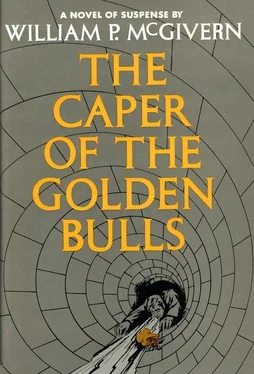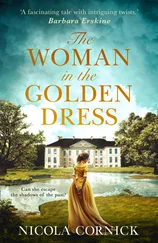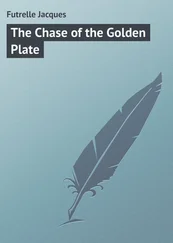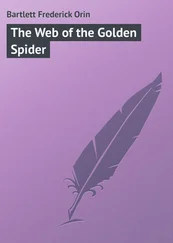William McGivern - The Caper of the Golden Bulls
Здесь есть возможность читать онлайн «William McGivern - The Caper of the Golden Bulls» весь текст электронной книги совершенно бесплатно (целиком полную версию без сокращений). В некоторых случаях можно слушать аудио, скачать через торрент в формате fb2 и присутствует краткое содержание. Город: New York, Год выпуска: 1966, Издательство: Dodd, Mead & Company, Жанр: Криминальный детектив, на английском языке. Описание произведения, (предисловие) а так же отзывы посетителей доступны на портале библиотеки ЛибКат.
- Название:The Caper of the Golden Bulls
- Автор:
- Издательство:Dodd, Mead & Company
- Жанр:
- Год:1966
- Город:New York
- ISBN:нет данных
- Рейтинг книги:4 / 5. Голосов: 1
-
Избранное:Добавить в избранное
- Отзывы:
-
Ваша оценка:
- 80
- 1
- 2
- 3
- 4
- 5
The Caper of the Golden Bulls: краткое содержание, описание и аннотация
Предлагаем к чтению аннотацию, описание, краткое содержание или предисловие (зависит от того, что написал сам автор книги «The Caper of the Golden Bulls»). Если вы не нашли необходимую информацию о книге — напишите в комментариях, мы постараемся отыскать её.
The identity of the notorious criminal, Black Dove, still baffles the officers of Interpol, the Surete and Scotland Yard. But there is nothing to connect him with Peter Churchman, an Englishman living quietly in Southern Spain with his bright new love. Until Angela reappears, fragile and evil, with her old power over him and her old craving for money...
The Caper of the Golden Bulls — читать онлайн бесплатно полную книгу (весь текст) целиком
Ниже представлен текст книги, разбитый по страницам. Система сохранения места последней прочитанной страницы, позволяет с удобством читать онлайн бесплатно книгу «The Caper of the Golden Bulls», без необходимости каждый раз заново искать на чём Вы остановились. Поставьте закладку, и сможете в любой момент перейти на страницу, на которой закончили чтение.
Интервал:
Закладка:
“Where is Francois?”
“In the Castillo, drinking. He wouldn’t stay alone at the hotel.”
“Let’s go.”
She smiled ironically. “I see how touched you are by my problems.”
“You’re worrying about the future. That’s a luxury I can’t afford.”
“You may wish you had, dear.”
Peter filed the remark away in a compartment of his mind, which he thought of as a repository for ticking bombs. Then he turned off the lights in the shed and they walked up the bank of the river towards the Plaza del Castillo.
Francois said: “So what have you two been cooking up?” He was drinking brandy. “Or were you strolling about the town like sweethearts?” He smiled coldly at Angela. “Did he tell you your body was made by glassblowers and magicians?”
“Shut up,” she said.
“I will not shut up!”
They had found him at a table on the terrace of the Café Kutz, seated with his back to a wall, a half-dozen saucers stacked before him. Peter glanced at the drink Francois was holding.
“I’d advise you to make that a nightcap.”
“When I want your advice, I’ll ask for it.”
The plaza was boiling with noise and excitement. Fireworks erupted from the small park in the middle of the square. Red and white Roman candles raced towards the sky with huge whooshing explosions, and disintegrated into a billion gaudy patterns high in the darkness. The streets and sidewalks were thick with reeling tourists and Spaniards, all slung with goatskins of wine. Weaving snake lines of dancers clogged traffic. Dozens of Cabezudas swayed high above the heads of the crowd. Some were made up as devils and witches, others as clowns and bishops and gypsies. Fire-bulls, toros built of papier- mâché, belched flame from their nostrils, shot sparkling puffballs of smoke from their hollow horns. The incessant pound of explosives mingled with the brassy thud of marching bands.
This was the sound of San Fermin, rhythmic, huge, incessant. It was as if rubber truncheons were beating against the underside of the earth; the sounds seemed to explode underneath the feet, and go rocking and blasting up the legs and spine, to burst inside the head.
The terraces of all the cafés ringing the plaza were jammed with tourists. Tables were thick with bottles and glasses and saucers.
Everyone was calling for drinks. The waiters squeezed themselves tortuously through the crowds, flushed and sweating, trays balanced precariously over their heads.
Snippets of talk rustled about Peter’s ears like scraps of paper in a gale.
“If you drink that I’m going back to the hotel.”
“Hemingway said Cagnacho was yellow. Look it up, Old buddy, look it up.”
“It’s a goddam shame the way they spoil these places—”
“...didn’t come here to sit in a hotel and watch you write postcards—”
“...I didn’t say he was yellow, Hemingway did.”
“Left Bank, the Dome and Select, even the Village, they’ve spoiled all of it.”
“...lot he knew.”
“...sure, Chicago used to be a good town.”
“...you shouldn’t have done that, dear. Waiter? You really shouldn’t.
Just remember to tell Dr. Abrams about this little indulgence. Don’t conveniently forget it, dear. Waiter!”
“...then why did he shoot himself, buster?”
Francois ordered another brandy. He wore sunglasses and a cap pulled down low on his forehead, but Peter sensed that his eyes were flicking intently and nervously about the terrace of the café.
“I have been very trusting, very co-operative,” Francois said in a thick, angry voice. “Good Francois. He lies in the sun, not a worry in his head. Tell him this, tell him that, he nods and smiles and does what he’s told. But I’m not a fool.”
“Who said you were?”
“How do we leave the bank Sunday morning?”
“I told you twice. The old storm drains run under the bank. They’re dry this time of year. We will follow them to the river.”
“Then why do we give the things to her?”
“Because there’s an elbow of the drain that’s only fourteen inches wide.”
“I’m tired of your clever plans. I’m sick of hearing how smart and formidable you are. You’re doing this for nothing but honour? And Phillip? He takes a little money, but very little. And he’s not the least curious about what we’re after. And your woman, that great iceberg, she is working for nothing too. Just like that crazy old bullfighter. I’m smothered by this philanthropy. I ask myself why you’re so good to me, so charitable.”
“Francois, this is no time for trouble,” Angela said quietly.
“No, good faithful Francois mustn’t make trouble! I must do what I’m told, like a well-trained dog. I’m sick of it. I’m sick of being ordered about by this clever, dangerous thief, the famous Black Dove.”
Peter gripped the neck of the brandy bottle. “Listen, Francois,” he said very quietly. “If you don’t shut up now, I’m going to knock all your front teeth down your throat.”
“But—”
“I said shut up.”
A roar like a mighty wave washed over the plaza. From the balconies, floodlights swept across the crowds in the streets, cutting so swiftly and blindingly through the darkness, and in such intricate and dazzling patterns, that the effect was as fantastic and impressive as great swords swinging in the hands of giants.
Everyone was standing, climbing on to chairs and tables.
To a roaring drumbeat, the Virgins of Spain were entering the Plaza del Castillo, borne on massive and dazzlingly decorated floats by hundreds of proud attendants.
Angela stood on tiptoe, straining to see, and the glitter in her eyes was no less vivid than the blaze of the jewels on the arms and throats of the Virgins.
Each float was surrounded by a cordon of police and soldiers. When the platforms dipped and swayed with the rhythmically lurching strides of the men supporting them, the motion caused sparkling eruptions from the gems and jewels hung about the statues of the Virgins.
Everyone was cheering. In stately sequence, and to mounting applause, the serenely expressionless statues were carried about the square, bathed in brilliance from the spotlights. The Blue Tears of Santa Eulalia, gleaming at the throat of the Virgin of Granada, earned an ovation. They were followed by the Golden Oars of Navarre, the Silver Slippers of Saint Peter, and the Tears of Christ incredible rubies supported on golden pilasters. Then a gasp of admiration swept the plaza like a sudden gale, as the Diamond Flutes of Carlos and the Countess of Altamira’s Net and Trident of diamonds were borne into the square.
Peter studied them thoughtfully. Angela’s eyes were on fire.
The Flutes of Carlos were not musical instruments, but exquisite silver columns whose miniature Doric capitals were studded with square-cut diamonds. There were three of these, each eleven inches long, and each worth, Peter estimated, about a million dollars on the fence market, and perhaps three times that if it were possible to sell them honourably over the counters of Cartier’s or Tiffany’s.
The pliable gold mesh which secured the Net of Diamonds was hung like a wedding veil on the smooth plaster brow of the Virgin of Seville. In her arms was the Trident of Diamonds. The Trident symbolised the Holy Trinity of the Catholic faith, and each of its tines was capped by a diamond, of a size and perfection, chosen, it was understood, to represent the relative status of the personages of the Divine Triumvirate. The Father’s was the largest; the Son’s was next in size, while the Holy Ghost’s was the smallest of the three, but any one of them, Peter thought, was big enough to use as a doorstop.
Theologians had explained these disparities in size variously; some held that the Divine Spirit, being pure essence, was best served and symbolised by the smallest stone; others insisted that the difference was seeming, not real, since all material riches were the same, i.e. nothing, in the eyes of the Lord; a modern view had it that the overshadowing of the Son by the Father was apostate and Oedipal; but another camp (the syndicalists) argued that the Son and Spirit (Worker, Union) were conclusively greater than the Father (the State), and while this was interesting in theory, its application in the area of practical politics had landed quite a few people in jail. A waiter touched Peter’s arm. “A note for you, senor.”
Читать дальшеИнтервал:
Закладка:
Похожие книги на «The Caper of the Golden Bulls»
Представляем Вашему вниманию похожие книги на «The Caper of the Golden Bulls» списком для выбора. Мы отобрали схожую по названию и смыслу литературу в надежде предоставить читателям больше вариантов отыскать новые, интересные, ещё непрочитанные произведения.
Обсуждение, отзывы о книге «The Caper of the Golden Bulls» и просто собственные мнения читателей. Оставьте ваши комментарии, напишите, что Вы думаете о произведении, его смысле или главных героях. Укажите что конкретно понравилось, а что нет, и почему Вы так считаете.












